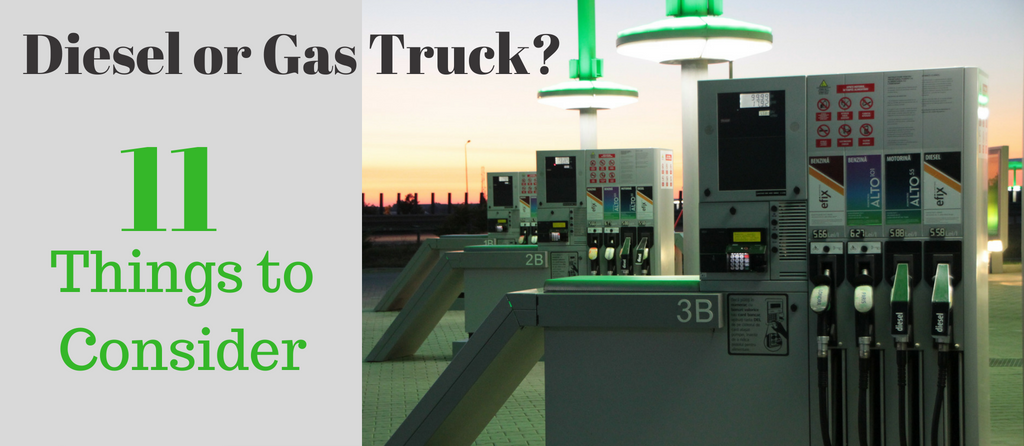
Diesel vs. Gas Truck? Surprising Result at The End of The Battle
The question “Should I Buy Diesel or Gas Truck” is old as much as the first diesel-powered truck. Back in 80’ Ford revealed first truck equipped with 6.9L V8 Navistar International diesel engine. Since then, the buzz around the diesel vs. gas truck makes drivers argue and praise their choice. The line between diesel and gas engines is so much blurred, and it is very hard to give a straightforward answer. There are so many variables in the equation that needs to be viewed from many perspectives. Fuel prices change, technological development of the engines, personal requirements, job and vocation needs, and many other kinds of stuff will influence your decision. That being said it is challenging to give advice that is a general rule of thumb but here are the 11 things you should consider if you are in doubt to buy diesel or gas truck?
Truck Price
The initial price of a diesel truck is always higher compared to the gas counterpart. For the high-duty truck difference in price can be up to $10,000. Small diesel trucks cost around $5,000 more than gas version of the same model. To give you an example we’ll mention 6.6L Duramax diesel engine in Chevy Silverado. If you choose diesel version (regardless trim level), you need to pay $9,945 above MSRP. Another example but with smaller engine capacity is RAM 1500. 3.0L V6 EcoDiesel cost $4,495 extra. Now do the math. How many gallons of fuel can you buy for $10,000 or $5,000? How many miles can you drive with that amount of fuel? Of course, add into the equation how many miles you drive a year? Pretty simple calculation, right?Fuel Economy
There are many tests done by specialized truck online magazines and reputable vblogs on YouTube that clearly show that diesel trucks have better fuel economy. But, the difference in fuel economy is not so big as two decades ago or more. Gas engines have adopted many technical solutions from diesel counterparts, like variable turbochargers and transmission technology. Best gas mileage truck MPG is quite similar to diesel one, around 2 MPG if you are using your truck for casual visits to Walmart. If you, on the other hand, use the truck for towing and hauling a lot of heavy cargo or trailer, diesel fuel efficiency comes into the first plan. However, the fuel economy battle wins the diesel truck.Fuel Cost
Fuel prices are going up and down lately. But it is fair to say that diesel is more expensive than gas for more than ten years. If you look at the latest fuel reports for Houston, TX, you’ll notice that price of $2,42 for regular and $2,69 for diesel. Not to mention that some gas stations don’t offer diesel at all. So, diesel is more expensive per gallon, and this one clearly goes to a gas truck.DEF (Diesel Exhaust Fluid)
Diesel trucks require the use of diesel exhaust fluid. Yes, except oil, diesel truck needs urea-based fluid to reduce NOx or oxides of nitrogen emissions. DEF is an essential part for functioning SCR system. At this link, you can find technical details about fluid. DEF consumption depends greatly on your towing needs. If you don’t need to tow heavy trailers, you may have to fill in DEF every 5,000 or 6,000 miles. The heavier towing you get, the more DEF you will need. Price of DEF is something you need to calculate in fuel cost. Diesel Exhaust Fluid, that is certified by 22241 ISO standard and is approved for use in every diesel engine with SCR system cost around $2,85 per gallon. Pro Tip: Take your truck to truck stop fuel station and fill up DEF fluid at the pump. It is much cheaper than buying in cases, plus DEF is fresh since gas stations are very busy and frequent places. Owners of gas trucks don’t need to think about urea-based fluids in their vehicle. This one also goes to the gas engine.Related Articles
- Truck Bed Size Chart and Dimension Expert’s Guide
- Box Truck Shelving and Accessories
- Best All-Terrain Truck Tires Compared and Ranked
- How to Buy Work Truck - Ultimate Guide
- 5 Truck Bed Accessories For 10 Time Better Organization
- 5 Small Trucks for Big Jobs
- 5 Best Dually Trucks for Towing
- 5 Best Trucks for Snow
- 5 Best Used Pickup Trucks to Buy in 2019
- 10 Best Used Trucks Under $10,000
